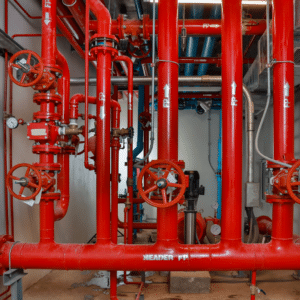Your fire sprinkler system is integral to the protection of your business and the safety of your building occupants. Partnering with a reputable Orlando fire sprinkler testing company should be at the top of your to-do list.
You wouldn’t buy a car and never have it serviced, would you? Professional mechanics can tell you if your vehicle needs repairs or regular maintenance. Without these periodic inspections, you could be stranded on the side of the road.
The same is true of your fire sprinkler system, except the worst-case scenario is worse than being stuck. Simply having a sprinkler system installed does not make your building safe. It’s a great first step, but you need a professional Orlando fire sprinkler testing company in your Rolodex (or your phone, if you’re not Don Draper) to ensure your system functions prope
DynaFire has been keeping Central Florida businesses safe for 20 years, and we want to share why this particular Fire & Life Safety tip is so important.
How Often Should We Inspect Your Fire Sprinkler System?
Your car needs service every 10,000 miles; likewise, the NFPA recommends servicing your fire sprinkler system at specific intervals to keep it going strong. Annual inspections are the safest bet, with approved intervals of nine to 15 months between inspections.
Our technicians recommend a standard yearly inspection schedule to keep you on track. We can put you on our rotation and visit your facility yearly, so you don’t have to worry about going too long between inspections.
What Needs To Be Inspected?
You may think that looking at your sprinkler system is enough to deem it functional, but a professional inspection goes beyond what can be seen with the naked (or untrained) eye.
Visual inspection from the floor – Our inspectors will check your sprinklers during their initial walkthrough before moving on to the rest of the inspection.
All sprinklers must be inspected – This is not the time for a “if you’ve seen one, you’ve seen them all” joke. Every sprinkler head must be inspected unless they are located in concealed spaces like above suspended ceilings.
What Are We Looking For During An Inspection?
A leak is an obvious sign that your fire sprinkler needs attention, but we are looking for many other indications that repairs are necessary during your inspection.
- Sprinklers installed in the incorrect orientation
- Minimum clearance to storage is maintained
- Leakage
- Loss of fluid in the glass bulb heat-responsive element
- Corrosion detrimental to sprinkler performance
- Physical damage
- Loading detrimental to sprinkler performance
- Paint other than that applied by the sprinkler manufacturer
What’s Tested During An Inspection Appointment?
Once a visual inspection has been completed, we will move on to the testing portion of our visit. Regular testing is crucial to the proper functioning of your fire sprinkler system, and we will perform the following tests as mandated by NFPA 25:
- Main Drain Test – The annual main drain test verifies the adequacy of the water supply at the system riser, identifies changes that may impact the sprinkler system’s performance, and ensures operational drain valves.
- Water Flow Test – The quarterly water flow test confirms the functionality of water flow detecting devices, alarms, and the transmission of signals to the central station.
- Fire Pump Test – This annual performance test assesses the flow and pressure performance of the fire pump.
- Dry Pipe Valve Trip Test – This annual test opens the control valve partially to release water. The system must trip within 60 seconds. A full flow trip test is required every three years, involving fully opening the control valve to allow water flow, with the same 60-second tripping requirement. Post-test, the low points are drained, and the valve is reset for both scenarios.
- Hydrostatic Test – While not mandated in your annual NFPA 25 inspection, the five-year or functionality test is a Fire Department requirement. This test ensures that fire sprinkler/standpipe components are operational and meet the standards for fire department use.
How Can A Damaged Or Malfunctioning Fire Sprinkler System Harm Your Business?
When your fire sprinkler system isn’t working correctly, it can pose a hazard to many aspects of your business. The worst-case scenario is that your fire sprinklers won’t activate when there is a fire. Not only could this cause property damage, but it can also put the lives of your building occupants at risk.
On the flip side, your fire sprinkler system might activate during a fire. However, if the sprinkler heads are damaged, your pipes are corroded, or your fire pump isn’t working, the effective dispersion of water may be compromised, resulting in the fire not being extinguished. And what good are fire sprinklers if they don’t put out a fire? About as helpful as your car on the side of the road.
If your sprinkler system does not perform as it should, your business could be offline longer, costing you money. It’s bad enough if a fire breaks out, but prompt extinguishing lessens property damage and gets your business back up and running faster.
Let Our Orlando Fire Sprinkler Testing Company Protect Your Business
Saving lives and protecting business is what we’re all about at DynaFire. Let us perform your regular fire sprinkler inspections so that if you need it, your system performs perfectly. Contact us today for more information.







